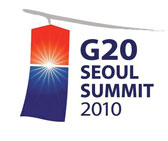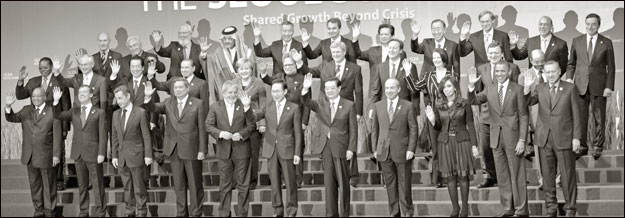G20 at Seoul: Change evolutionary but tangible
Jayatilleke DE SILVA
 Two events attracted media attention last week. While young Chinese
sportsmen and sportswomen were re-writing the country’s sports history
in colourful Guangzhou Chinese President Hu Jintao was busy at the G20
Summit in Seoul. While the first event was unparalled in its splendour
and youthful spirit it was the latter that was far more important for
both China and the world at large. Two events attracted media attention last week. While young Chinese
sportsmen and sportswomen were re-writing the country’s sports history
in colourful Guangzhou Chinese President Hu Jintao was busy at the G20
Summit in Seoul. While the first event was unparalled in its splendour
and youthful spirit it was the latter that was far more important for
both China and the world at large.
|

Heads of States at the G-20 Seoul Summit. AFP |
The G20, a consortium of developed and developing nations was
established in 1999 in the wake of the Asian financial crisis with a
view of stabilizing the global financial system. After the Global
Financial Crisis which erupted in September 2008 G20 shot into
prominence as the leading group of nations that was entrusted with
finding ways and means of recovering from the crisis. At its Pittsburg
Summit G20 was designated the premier international forum for
international economic cooperation in 2010.
Member states
The G20 member states are Argentina, Australia, Brazil, Britain,
Canada, China, France, Germany, India, Indonesia, Italy, Japan, Mexico,
Russia, Saudi Arabia, S Africa, S, Korea, Turkey, United States and the
EU. The G20 represents 90 percent of the global GNP and 80 percent of
the world trade.
As far as the international media was concerned there was much
adverse publicity to the event. They were speculating about currency
wars and a possible impasse on trade agreements. There were even
predictions of a head-on clash between the global economic titans -
United States and China. Adding insult to injury there were also
demonstrations outside the venue in Seoul in which several thousands
participated.
While the West, particularly put pressure on China to devalue its
currency, the action of the United States in injecting US $ 600 billion
to its economy irked China and other nations that has huge reserves of
US treasury bills and dollars.
Among other key issues that attracted attention at the Summit were
the need for financial regulation at the global level, reform of the IMF
including its governance and completion of the Doha round of trade
talks.
World economy
Chinese President Hu Jintao addressing the Summit outlined a
four-point plan framework for sustainable, balanced growth of the world
economy. The four points were (1) to take full account of different
national circumstances and stages of development respecting each
country’s choice of the path of development policies (2) championing
open trade and promoting co-ordinated development (3) reforming world
financial system and promoting stable development and (4) narrowing the
development gap and promoting balanced development.
Despite the contradictory nature of the demands put forward by
developed and developing nations the Summit was able to arrive at a
compromise in which both sides claimed satisfaction. True to the nature
of such halfway arrangements there remain still grey areas the
elimination of which have to be tested in practice.
The Seoul Acton Plan approved by the Summit speaks of specific
commitment of nations in several policy areas. It says, “We recognize
that while there are common factors, there is no single formula for
development success. We must therefore engage other developing countries
as partners, respecting national ownership of the country’s policies as
the most important determinant of its successful development, thereby
helping to ensure strong responsible accountable and transparent
development partnerships between the G20 and Least Industrialized
Countries”.
Developing countries
The similarity between this policy and that enunciated by President
Hu Jintao is at once apparent. This is a far cry from the days when the
G7 prescribed remedies in accordance with the Washington Consensus and
decried independent paths of development.
The Seoul Action Plan also outlines the following measures;
n undertake macro-economic policies, including fiscal consolidation
where necessary...enhancing exchange rate flexibility to reflect
economic fundamentals and refrain from competitive devaluation of
economies
* implement a range of structural reforms that assist and sustain
global demand for job creation and increase potential for growth
* to enhance Mutual Assessment Policy (MAP) to promote external
sustainability
* a modernized IMF that better reflects the changes in the world
economy through greater representation of dynamic emerging markets and
developing countries
* comprehensive quota and governance reforms in the IMF
* developing core elements of a new financial regulatory framework
and
* properly concludes the Doha Round of trade talks.
The G20 approved the proposed six percent shift in the IMF quota
system in favour of developing countries.
The G20 also decided to work further for a Macro-Prudential Policy
framework that better reflect the perspectives of emerging market
economies in financial regulatory reforms, strengthen regulational
oversight of shadow banking, further work on regulation and supervision
of commodity derivative market, improve market efficiency and integrity,
enhance consumer protection, reform IMF, WB and build a more stable
international monetary system.
Chinese delegation
The Chinese G20 delegation spokesman Ma Zhaoxu said the “Summit
witnessed the framework of G20 shifting its focus from emergency
response to long-term economic governance”.
From the perspective of the developing nations the biggest plus point
of the Seoul Summit is the decision to give six percent additional quota
and two seats in the Executive Council of the IMF to the developing
countries. This will further strengthen their position in governing the
world financial system.
What is more important is that the G20 leaders also specified a
timeline, recommending a review of the quota formula by January 2013 and
the next general review by January 2014.
President Obama has also hailed the outcome of the Summit but is
facing much criticism at home for failing to get China’s consent for a
devaluation of its currency.
There are also other finer points such as using new terminology that
is more advantageous to developing countries that pursue an independent
path of economic development. For example the Seoul communique speaks of
‘market-determined exchange rates’ instead of ‘market-oriented exchange
rates’.
The changes achieved are evolutionary but tangible. Much depends on
the actions of the two big powers in the world economy - the US and
China. President Zarkosy of France admitted that they cannot order them
to act.
Just as the taste of the pudding is in the eating it is only practice
that would be able to give a final assessment of the Seoul Summit. |



